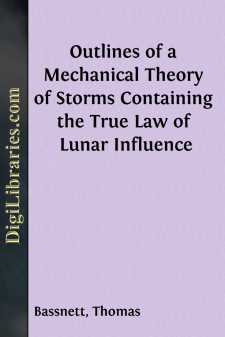Categories
- Antiques & Collectibles 13
- Architecture 36
- Art 48
- Bibles 22
- Biography & Autobiography 813
- Body, Mind & Spirit 142
- Business & Economics 28
- Children's Books 16
- Children's Fiction 13
- Computers 4
- Cooking 94
- Crafts & Hobbies 4
- Drama 346
- Education 46
- Family & Relationships 57
- Fiction 11829
- Games 19
- Gardening 17
- Health & Fitness 34
- History 1377
- House & Home 1
- Humor 147
- Juvenile Fiction 1873
- Juvenile Nonfiction 202
- Language Arts & Disciplines 88
- Law 16
- Literary Collections 686
- Literary Criticism 179
- Mathematics 13
- Medical 41
- Music 40
- Nature 179
- Non-Classifiable 1768
- Performing Arts 7
- Periodicals 1453
- Philosophy 64
- Photography 2
- Poetry 896
- Political Science 203
- Psychology 42
- Reference 154
- Religion 513
- Science 126
- Self-Help 84
- Social Science 81
- Sports & Recreation 34
- Study Aids 3
- Technology & Engineering 59
- Transportation 23
- Travel 463
- True Crime 29
Outlines of a Mechanical Theory of Storms Containing the True Law of Lunar Influence
by: Thomas Bassnett
Categories:
Description:
Excerpt
SECTION FIRST.
PRESENT STATE OF METEOROLOGY.
The present state of the science of which we are about to treat, cannot be better defined than in the words of the celebrated Humboldt, who has devoted a long life to the investigation of this department of Physics. He says: “The processes of the absorption of light, the liberation of heat, and the variations in the elastic and electric tension, and in the hygrometric condition of the vast aërial ocean, are all so intimately connected together, that each individual meteorological process is modified by the action of all the others. The complicated nature of these disturbing causes, increases the difficulty of giving a full explanation of these involved meteorological phenomena; and likewise limits, or wholly precludes the possibility of that predetermination of atmospheric changes, which would be so important for horticulture, agriculture, and navigation, no less than for the comfort and enjoyment of life. Those who place the value of meteorology in this problematic species of prediction, rather than in the knowledge of the phenomena themselves, are firmly convinced that this branch of science, on account of which so many expeditions to distant mountainous regions have been undertaken, has not made any very considerable progress for centuries past. The confidence which they refuse to the physicist they yield to changes of the moon, and to certain days marked in the calender by the superstition of a by-gone age.”
The charge thus skilfully repelled, contains, however, much truth; there has been no adequate return of the vast amount of labor and expense thus far devoted to this branch of knowledge. And it is not wonderful that the popular mind should expect a result which is so much in accordance with the wants of mankind. Who is there whose happiness, and health, and comfort, and safety, and prosperity, may not be more or less affected by reducing to law, the apparently irregular fluctuations of the weather, and the predetermination of the storm? To do this would be the crowning triumph of the age; and the present theory has pioneered the way for its speedy accomplishment.
That the present order of things had a beginning, is taught by every analogy around us, and as we have the glaring fact forced upon us, that our globe has experienced a far higher temperature on its surface than obtains at present, and moreover, as it is demonstrated beyond a cavil, that the interior is now of far higher temperature than is due to solar radiation, we are justified in concluding, not only that the condition of the interior of our globe is that of fusion, but that its original temperature was far higher than at present; so that the inference is allowable that there has been a time when the whole globe was perhaps in this state. But why should we stop here? There are three states of matter, the solid, the fluid, and the gaseous; and with this passing glance at the question, we will jump at once to the theory of La Place,—that not only our own globe, but the whole solar system, has been once in the nebulous state.
In justice to himself, the author ought to remark, that he had reasoned his way up to this starting point, before even the name of La Place had reached his ears. He makes the remark in order to disclaim any desire to appropriate that which belongs to another; as he may innocently speak of things hereafter, the idea of which has occurred to others. It is not his intention here to say a word pro or con on the nebular hypothesis; it is sufficient to allude to the facts, that the direction of rotation and of revolution is the same for all the planets and satellites of our system; and that the planes on which these motions are performed, are nearly coincident. That this concordance is due to one common cause, no one acquainted with the theory of probabilities will pretend to deny.
GREAT OBJECT OF LA PLACE.
The science of Astronomy occupies a pre-eminent rank in the physical circle, not only on account of that dignity conferred upon it in the most remote antiquity, or as being the grand starting point—the earliest born of science—from whence we must contemplate the visible creation, if we would reduce its numerous details into one harmonious whole; but also on account of its practical fruits, of the value of which modern commerce is an instance....


